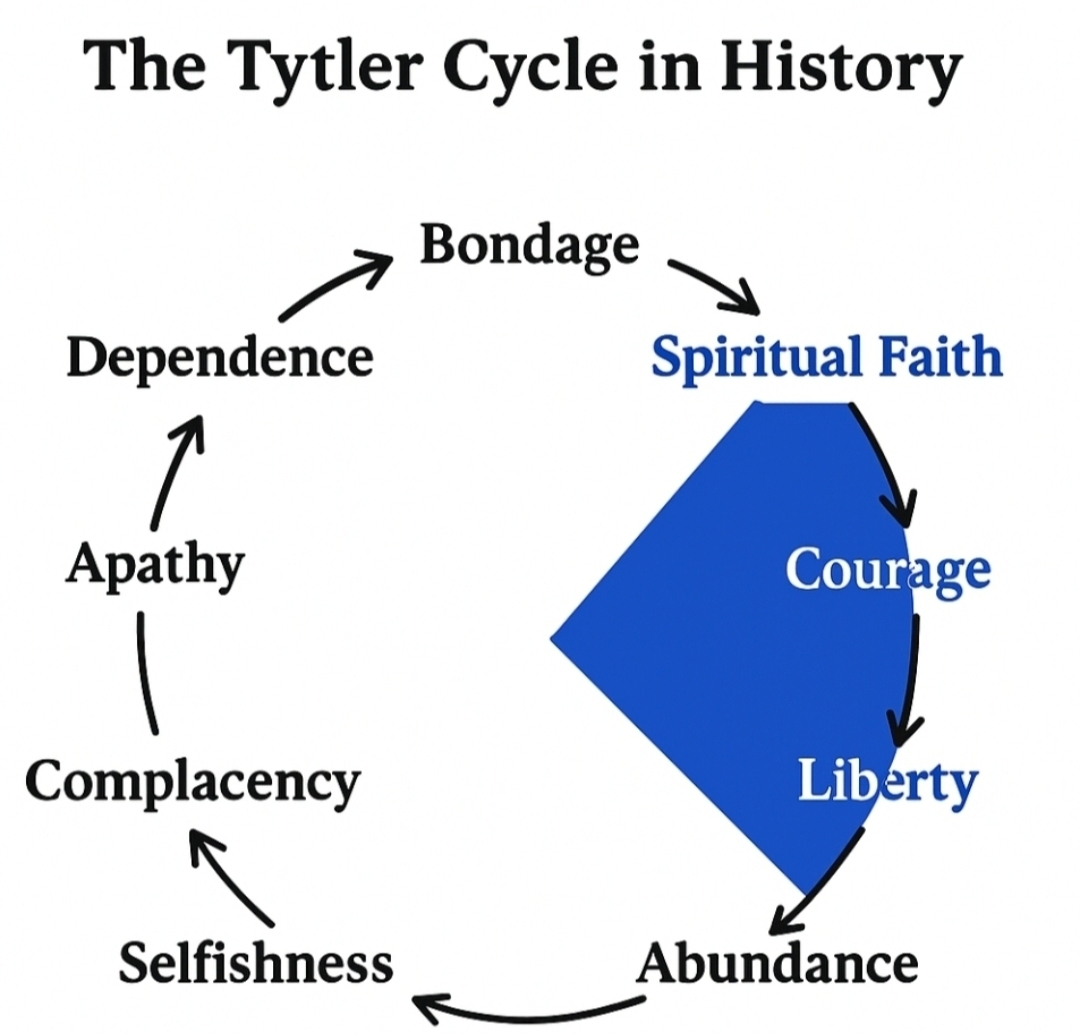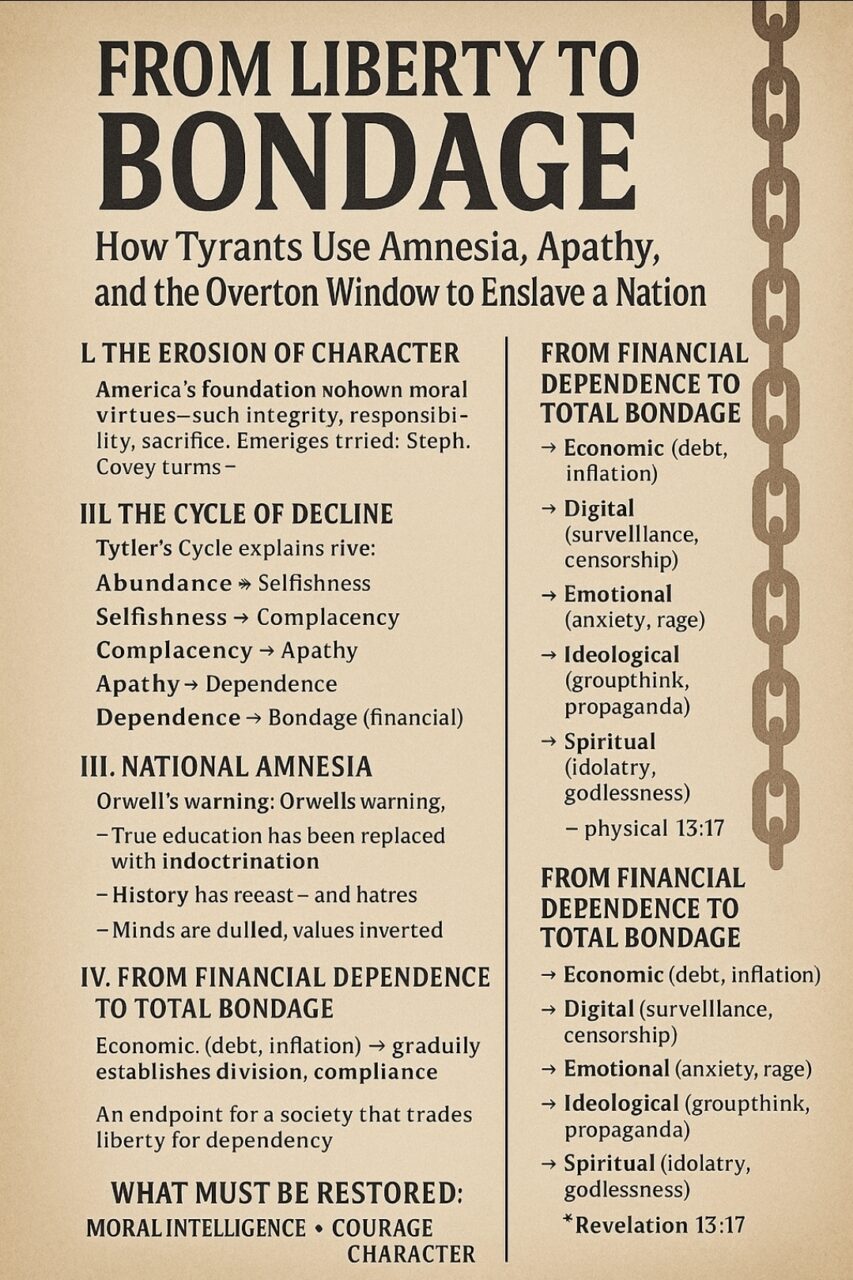Core Question: What restores a broken kingdom—power reclaimed, or responsibility embraced?
Tagline (spirit): “Kingship without conscience is tyranny; kingship ordered by Agápē becomes stewardship.”*
The Lion King isn’t about a prince getting his throne; it’s about power remembering its purpose. Scar shows how charisma unmoored from conscience starves a nation. Simba shows that the remedy isn’t a stronger fist but a truer oath—responsibility accepted for the sake of others. If America is a covenant people, renewal won’t come from swapping rulers but from re-ordering power to service—neighbors first, process over spectacle, promises kept. Do that, and the “rains return.”
Covenant vs. Contract
In Pride Rock, kingship is not a personal perk; it’s a trust ordered to the flourishing of the whole. That’s close to the American founding idea of a covenant of self-government: power derived from the people, limited by higher law, exercised for the common good. Scar breaks that order; he treats the throne as loot. When rulers forget who power is for, the land itself suffers—The Lion King makes the moral ecological: the drought mirrors disorder in the palace.
Charisma without Conscience
Scar is clever, media-savvy, and coalition-building (“Be Prepared”)—but hollow of virtue. That’s the Tytler slide from abundance → selfishness → apathy → dependence: short-term spectacle replaces stewardship, and the costs are pushed to the margins (hyenas eat first; everyone else starves). Modern parallels: debt-financed politics, permanent emergencies, and culture-war theatrics that feed factions while institutions atrophy.

Remember Who You Are
Simba’s turning point isn’t raw strength; it’s identity recovered (“remember who you are”). That’s the covenant move: return to first principles. In Tytler’s positive arc (bondage → spiritual faith → courage → liberty), renewal begins with repentance and responsibility, not better branding. Simba doesn’t seize power to indulge himself; he accepts responsibility to serve. “Agápē in public” is just ordered liberty with skin on it.

Where We’re Drifting
We look like late-cycle Scar—plenty of abundance, rising selfishness, growing apathy/cynicism, and new forms of dependence (on debt, on administrative decrees, on digital gatekeepers). The “drought” shows up as family breakdown, civic distrust, brittle supply chains, and institutions that prefer optics to outcomes.
What restores a broken kingdom—power reclaimed, or responsibility embraced?
Answer: responsibility embraced
If we only trade jerseys (reclaim power) without re-ordering it to service, we repeat Scar with a different slogan. Renewal is not a personnel swap; it’s a purpose swap.
Concrete “Simba moves” for a covenant republic
Covenant renewal (identity):
- Teach and live the creed: image-bearing dignity, due process, equal protection, ordered liberty.
- Local covenants: church, school, guilds, mutual-aid—small promises kept at scale.
Stewardship over spectacle (virtue):
- Leaders judged by receipts: legal basis, costs, metrics, exit plans; not vibes.
- Sunsets on emergency powers; single-subject bills; recorded votes; warrants for data—process is protection.
Subsidiarity (who power is for):
- Push decisions to the lowest competent level; state and local first, federal last.
- Encourage ownership: families, small business, co-ops—less dependence, more agency.
Economy that serves households (rain returns):
- De-leverage public and private life; stop treating debt as growth.
- Reshore critical supply; reward productive work over financial engineering.
Culture of repair (circle holds):
- In homes: apology → amends → changed habits; teach truth-telling and restraint.
- Online/offline: argue ideas, humanize opponents, refuse mob rituals.
Guardrails against Scar (any party):
- Ban censorship-by-proxy; protect whistleblowers/inspectors general.
- Term/tenure limits for committee chairs; open primaries + ranked/runoff voting to weaken machine control.
Pride Rock: Name, Place, and the Weight of Promise
Moral Core: Vocation vs. vanity
Simba receives a name and a place—son of Mufasa, heir to the Circle of Life. Mufasa frames kingship as service: everything you see exists together in a delicate balance. Scar whispers a counterfeit—power as entitlement. Simba sings “I Just Can’t Wait to Be King,” confusing rule with self-rule.
Lessons
- Identity is a gift before it is an achievement.
- Authority’s telos is care for the whole, not self-amplification.
- Flattery and impatience counterfeit maturity.
Philosophical Frame
- Teleology (Aristotle): Power has a purpose—safeguard the common good.
- Natural Law: Harmony requires ordered desire, not appetite unchecked.
The Fall: Guilt, Exile, and the Lie That Runs Your Life
Moral Core: Shame vs. repentance; flight vs. formation
Scar engineers Mufasa’s death and gaslights Simba: it’s your fault—run away. Simba flees; Scar’s reign turns the Pride Lands into a wasteland (order broken → ecology broken). In exile, Timon and Pumbaa preach hedonistic therapy—“Hakuna Matata”—numbness posing as healing.
Lessons
- Shame isolates; truth restores.
- Private evasion becomes public decay (a king’s flight starves a kingdom).
- Pleasure can distract but cannot repair moral injury.
Philosophical Frame
- Moral psychology: Avoidance offers relief without repair.
- Stoicism (tempered): Peace is disciplined alignment with reality, not escape.
Remember Who You Are: Memory, Mentors, and Moral Reawakening
Moral Core: Narrative truth vs. escapist myth
Nala finds Simba; calls him home. Rafiki confronts him with living memory—“The past can hurt… you can either run from it or learn from it.” Mufasa in the sky: “Remember who you are.” Simba’s identity is not erased by failure; it demands repentance and return.
Lessons
- Memory is medicine: truth re-narrates shame into duty.
- Mentorship (Rafiki) uses play + pain to reopen conscience.
- Calling is recovered through responsibility, not self-assertion.
Philosophical Frame
- Augustinian memory: Identity braided with truthful recollection.
- Virtue ethics: Courage is choosing the right risk for the right end.
Return to Pride Rock: Tyranny Unmasked, Justice Repaired
Moral Core: Justice as restoration, not revenge
Simba confronts Scar. Scar’s demagoguery collapses under light and witness. When truth emerges (Scar’s murder), the prides unite; hyenas turn on Scar—the coalition of convenience fails. Rain returns as order is restored.
Lessons
- Justice requires truth + courage + community.
- Coalitions built on appetite implode under scarcity and truth.
- Forgiveness doesn’t negate consequences; accountability heals the body politic.
Philosophical Frame
- Civic virtue: Legitimate rule serves the ecosystem of life.
- Arendt: Lies fracture the world we share; truth re-enables politics.
The Circle Restored: Kingship as Agápē
Moral Core: Vocation over validation; stewardship over spectacle
Simba ascends not to be seen, but to serve—restoring balance, nurturing life. The closing presentation of Kiara mirrors the opening, now charged with wisdom: inheritance is a trust.
Lessons
- Leadership is custodial love—Agápē willing the good of subjects at cost.
- Renewal is ecological, relational, and moral.
- Legacy is formed by habits that keep the circle unbroken.
Philosophical Frame
- Eudaimonia: A flourishing pride depends on virtuous rulers and citizens.
- Personalism: Dignity of each creature grounds the ethics of rule.
Symbols & What They Mean
| Symbol | Meaning |
|---|---|
| Pride Rock | Seat of vocation; visibility paired with duty |
| The Circle of Life | Interdependence; moral order reflected in nature |
| The Scar | Wounded will-to-power; envy as festering injury |
| Wasteland/Drought | Consequence of disordered rule; moral → ecological collapse |
| Stars/Ancestral Sky | Transcendent accountability; memory as guide |
| Hakuna Matata | Numbing ideology—comfort without conscience |
| Roar | Voice of rightful authority—power channeled by justice |
Core Themes (with Real-World Applications)
Power as Stewardship
Lesson: Title ≠ license; authority exists for the common good.
Apply: Write a “stewardship charter” for leaders—who/what your decisions must protect first.
Shame vs. Responsibility
Lesson: Running relieves pain but deepens loss.
Apply: Replace blame spirals with truth + amends + return to duty protocols.
Narrative Control vs. Truth
Lesson: Scar rules by gaslight and scarcity.
Apply: Keep public ledgers—decisions, failures, corrections—so truth can heal trust.
Pleasure as Escape
Lesson: Hakuna Matata can be rehab or relapse.
Apply: Build rhythms of rest that point you back to duty, not away from it.
Agápē Kingship
Lesson: The highest authority serves the smallest life.
Apply: Test policies by their impact on the most vulnerable “creatures” in your ecosystem.
Character Arcs (as Moral Progress)
| Character | Starting Constraint | Transforming Moment | New Virtue |
|---|---|---|---|
| Simba | Entitled naiveté → shame exile | “Remember who you are” + return | Courage, responsibility, servant-kingship |
| Nala | Loyal conscience with limited agency | Calls Simba home; fights beside him | Prudence, fortitude, leadership |
| Mufasa | Just ruler, paternal educator | Death seals teaching with example | (Model) Justice, humility |
| Scar | Envy, ressentiment | Truth exposed; allies abandon him | (Negative) Hubris → ruin |
| Timon & Pumbaa | Hedonistic escapism | Risk for Simba in battle | Friendship (philia) maturing toward duty |
| Rafiki | Trickster sage | Initiates remembrance & repentance | Wisdom as joyful severity |
Moral Psychology (Kohlberg Mapping)
- Stage 2 (Self-interest): Young Simba’s thrill-seeking (“danger? I laugh in the face of danger”).
- Stage 3 (Approval): Desire to look like a king (song of self-display).
- Stage 4 (Law/Order): Mufasa’s instruction—order, boundaries, responsibility.
- Stage 5 (Social Contract): Recognition that the king answers to the Circle (common good).
- Stage 6 (Principle): Return at cost; truth-telling and just restoration.
A Practical “Lion King” Checklist (for people, orgs, communities)
- Stewardship Charter: Define who/what your power protects. Publish it.
- Truth & Return Protocol: When failure hits—confess, repair, re-enter duty.
- Scar Detector: Track decisions born of envy/scarcity; replace with service logic.
- Rest that Reorients: Design “sabbath” that equips responsibility (not escape).
- Ecology Audit: If morale or ethics rot, check leadership order—moral drought causes real droughts.
Final Reflection
The Lion King isn’t merely a prince’s homecoming; it is a treatise on rightly ordered power. Scar’s regime proves that charisma without conscience starves a land. Simba’s return shows that kingship is Agápē in public—bearing the weight of others’ lives with courage, truth, and care. When authority remembers who it is for, rains return, life sings, and the circle holds.
*What is Agápē?
In classical Greek, there are four common words for “love”:
- Agápē — sacrificial, unconditional love; wills the good of the other, even at personal cost.
- Érōs — romantic/erotic desire; attraction and longing.
- Philia — friendship/affection; comradeship shaped by shared virtue.
- Storgē — familial love; natural affection within family bonds.
Why Agápē fits The Lion King
Mufasa’s kingship = love as service
Mufasa rules by agápē: he risks himself for others (the gorge rescue), teaches just order (“everything the light touches”), and disciplines power to protect the smallest—food chain, not food fight.
Simba’s return is a costly yes
“Hakuna Matata” offers comfort without responsibility. Agápē pulls Simba home to face danger, confess failure, and bear the pride’s burdens. He wills the pride’s good over his shame and safety.
Nala’s brave truth-telling
Nala’s love isn’t flattery; it’s courageous summons. She confronts Simba’s escapism and calls him to vocation—philia refined by agápē (seeking his best and the kingdom’s good).
Scar as counterfeit love
Scar embodies philautia (self-love) masquerading as care. He weaponizes storgē (family ties) and manipulates philia (the hyenas) for domination. Love detached from others’ good collapses into predation.
The Circle of Life as ordered love
The land flourishes when power serves life. Under Scar’s grasping rule, the Pride Lands starve; under agápē-led stewardship, creation heals. Ecology mirrors ethics.
Ancestral memory and merciful truth
Rafiki’s guidance—“remember who you are”—is agápē in mentorship: not coddling, but truth that restores identity and sends Simba back for others’ sake.
Érōs rightly ordered
Simba and Nala’s romance matures when it bows to calling. Érōs becomes durable only when braided to agápē (service) and philia (shared courage).
Symbols that point to Agápē in The Lion King
- Pride Rock → authority as shelter, not throne.
- The Gorge → costly protection; a father’s self-gift.
- Drought & blight → love disordered into domination.
- Rafiki’s staff & sky vision → truth-telling love that heals and sends.
- Simba’s ascent → vocation reclaimed for the common good.
Quick takeaway
The Lion King teaches that a kingdom is saved not by might or nostalgia but by agápē—love that serves, protects, and restores. When kingship becomes self-gift, storgē deepens, philia strengthens, érōs steadies, and the Circle of Life turns green again.







